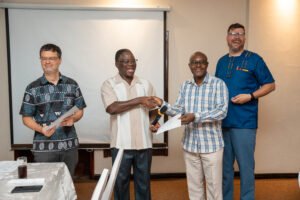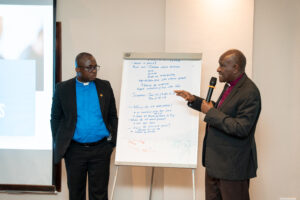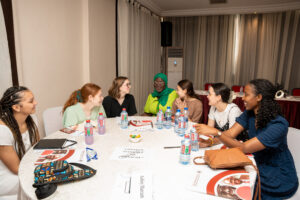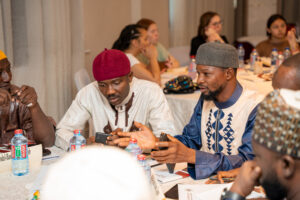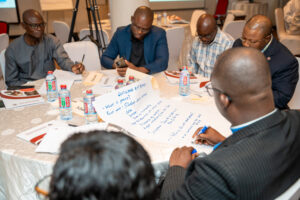 Those in attendance at our recent Multi-Faith Retreat in Accra, Ghana, were an example to the world about what it can look like for people of deep religious and even cultural differences to come together to build authentic relationships that affirm each other’s dignity, worth, and value while remaining deeply committed to the theological distinctions that make each of them who they are. MFNN recently spent a week in Accra, working with religious leaders from Christianity and Islam, Ghana’s two biggest religious communities. Together, Muslims and Christians make up around 91% of the Ghanaian population, according to the US State Department. Like most MFNN retreats, when the event began, the friendly Ghanaians were still mostly quiet toward many on the other side of the theological aisle. It did not take long, however, for that to change. As Imam Mohamed Magid, Rabbi David Saperstein, and Pastor Bob Roberts led the initial session, the group quickly laughed and enjoyed each other’s company. Points of tension, which often go unstated in events like this, were brought onto the table and addressed, demonstrating that MFNN’s model is unique and helps build relationships through honest dialogue rather than diminishing our differences. A key element of MFNN’s model is acknowledging that we have irreconcilable differences at points. Yet, we can still build deep relationships because we are honest about the differences we all know that we have and because we share a commitment to the dignity, worth, and value of every person.
Those in attendance at our recent Multi-Faith Retreat in Accra, Ghana, were an example to the world about what it can look like for people of deep religious and even cultural differences to come together to build authentic relationships that affirm each other’s dignity, worth, and value while remaining deeply committed to the theological distinctions that make each of them who they are. MFNN recently spent a week in Accra, working with religious leaders from Christianity and Islam, Ghana’s two biggest religious communities. Together, Muslims and Christians make up around 91% of the Ghanaian population, according to the US State Department. Like most MFNN retreats, when the event began, the friendly Ghanaians were still mostly quiet toward many on the other side of the theological aisle. It did not take long, however, for that to change. As Imam Mohamed Magid, Rabbi David Saperstein, and Pastor Bob Roberts led the initial session, the group quickly laughed and enjoyed each other’s company. Points of tension, which often go unstated in events like this, were brought onto the table and addressed, demonstrating that MFNN’s model is unique and helps build relationships through honest dialogue rather than diminishing our differences. A key element of MFNN’s model is acknowledging that we have irreconcilable differences at points. Yet, we can still build deep relationships because we are honest about the differences we all know that we have and because we share a commitment to the dignity, worth, and value of every person.
As MFNN’s influence in West Africa grows, it is increasingly apparent that there is a deep need for intervention efforts. West Africa is being recognized as one of the most significant places in the world for terrorist activity, and USCIRF has raised alarms about violence being perpetrated on religious communities, in particular. Attempts to do peacebuilding across the region that ignore religious actors are shortsighted in their approach, at best. As clerics and congregational leaders, in particular, serve as gatekeepers to entire communities, efforts like MFNN’s multi-faith retreats promise tremendous potential for peacebuilding if participants take seriously the need to build relationships across the divides that could potentially drive us further apart.
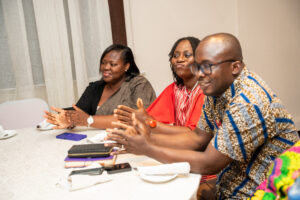 On multiple occasions, the participants were reminded that Ghana is a model for the rest of West Africa regarding religious pluralism. Through MFNN’s model, Ghana has an opportunity to increase its potential as a model, demonstrating how communities that may tolerate each other but who do not typically work together can collaborate for the greater good of the entire country. As Ghana grows in its commitment to multi-faith collaboration, this commitment can be exported to surrounding countries like Burkina Faso, Mali, Niger, Cote de Ivoire, and of course, Nigeria.
On multiple occasions, the participants were reminded that Ghana is a model for the rest of West Africa regarding religious pluralism. Through MFNN’s model, Ghana has an opportunity to increase its potential as a model, demonstrating how communities that may tolerate each other but who do not typically work together can collaborate for the greater good of the entire country. As Ghana grows in its commitment to multi-faith collaboration, this commitment can be exported to surrounding countries like Burkina Faso, Mali, Niger, Cote de Ivoire, and of course, Nigeria.
One of the most powerful moments of the retreat was the final session, as participants were divided into four regions from across Ghana and presented their action plans to engage in their regions around the country. These commitments included specific dates to share meals in each other’s homes, to bring their congregations together for a relational mixer, to engage in service projects together across congregations, to advocate for one another, particularly for each other’s religious freedom, and to add additional clerics to the work. Among the action plans were specific projects to clean up public places, experience each other’s religious holidays, plant trees together in their communities, host health screenings together, and, as they are in a presidential election season, collaborate to host learning sessions about the need for a peaceful democratic process, and how to help ensure a peaceful election process. These concrete plans were not theoretical. Specific dates and locations and lists of participants accompanied them. Great emphasis was placed on the priority of these activities being used to foster and develop relationships between the religious communities.
As the retreat gathered to a close, it was remarkable to see the various religious communities, which were standoffish at the beginning of the retreat, mingling and encouraging one another. These happy Ghanaians were not just happy in isolation. Their contagious happiness was spread across the entire group, and they were looking forward with great anticipation to the work and the results that were to come.
Since the retreat’s conclusion, each region formed WhatsApp groups, and these groups have been a hive of activity, checking in on each other, going back and reviewing the commitments made during the retreat, and clarifying plans for the coming days. These ongoing digital conversations portend the successful execution of these commitments made during the retreat.
